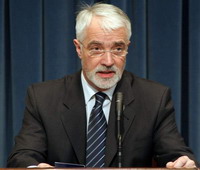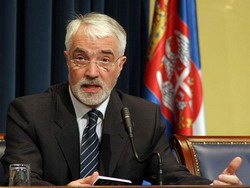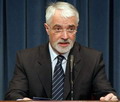Q:
A:
British investors express high interest in Serbia
Belgrade,
15 June 2005
Serbian Deputy Prime Minister Miroljub Labus said after having returned from an official visit to Great Britain that British investors are very interested in financing infrastructure projects in Serbia, especially in the field of telecommunications, road infrastructure, refineries, and the construction of the oil pipeline connecting Constanta, Pancevo, Omisalj, and Trieste.
Speaking at a press conference, Labus said that he had several successful meetings with prospective investors at the Confederation of British Industrialists. The general conclusion was that the realisation of these investments depends on Serbia in the first place and the holding of tenders because at that point, interested British investors will be revealed.
Labus announced that already tomorrow a conference will be held at which US Steel and the British American Tobacco, as investors in Serbia, will talk with prospective British investors. According to Labus, more than 60 prospective investors have applied to take part in this conference.
British companies have not had much presence on the Serbian market as of this time, the volume of trade with Serbia is very limited, and the possibilities for the expansion of both financial and trade cooperation are significant, Labus said and added that tomorrow's conference is the best way to present Serbia's investment climate to the British business community.
During the two-day visit to the UK, Labus had a number of important meetings - with British Deputy Prime Minister John Prescott, Minister of State for Europe Douglas Alexander, and representatives of the Ministry of Foreign Affairs and the UK Department for International Development (DFID).
Labus said that this visit came at the right moment since the UK takes over the presidency of the European Union on July 1. Following the failed referendums on the EU constitution in France and the Netherlands, the capitals of EU member countries are conducting a very active diplomacy at this moment, which, according to Labus, also influences Serbia's position and its future negotiations.
One of the main topics of the talks with UK officials was EU enlargement, Labus said and voiced satisfaction with the UK's official stance of full support to further EU expansion. It fully respects the 2003 declaration adopted in Thessaloniki in which heads of states and governments of EU countries pledged to accept all countries of the western Balkans, giving them the so-called potential candidate status.
One of the issues also discussed was the level of the EU budget for the period between 2007 and 2013 and its allocation. This is of great importance for Serbia, because the amount of funds which will be set aside for the process of accession of EU potential candidates will depend on the level of the EU budget and its allocation.
Labus and British officials touched on the issue of common agricultural policy, which is very important for Serbia because the EU sets aside a vast amount of funds for support to agriculture.
As for Serbia's negotiations on the stabilisation and association agreement with the EU (SAA), from Great Britain's standpoint the standards are still the same and there are no additional requests. However, the need for full cooperation with the Hague tribunal was reiterated.
Labus announced that already tomorrow a conference will be held at which US Steel and the British American Tobacco, as investors in Serbia, will talk with prospective British investors. According to Labus, more than 60 prospective investors have applied to take part in this conference.
British companies have not had much presence on the Serbian market as of this time, the volume of trade with Serbia is very limited, and the possibilities for the expansion of both financial and trade cooperation are significant, Labus said and added that tomorrow's conference is the best way to present Serbia's investment climate to the British business community.
During the two-day visit to the UK, Labus had a number of important meetings - with British Deputy Prime Minister John Prescott, Minister of State for Europe Douglas Alexander, and representatives of the Ministry of Foreign Affairs and the UK Department for International Development (DFID).
Labus said that this visit came at the right moment since the UK takes over the presidency of the European Union on July 1. Following the failed referendums on the EU constitution in France and the Netherlands, the capitals of EU member countries are conducting a very active diplomacy at this moment, which, according to Labus, also influences Serbia's position and its future negotiations.
One of the main topics of the talks with UK officials was EU enlargement, Labus said and voiced satisfaction with the UK's official stance of full support to further EU expansion. It fully respects the 2003 declaration adopted in Thessaloniki in which heads of states and governments of EU countries pledged to accept all countries of the western Balkans, giving them the so-called potential candidate status.
One of the issues also discussed was the level of the EU budget for the period between 2007 and 2013 and its allocation. This is of great importance for Serbia, because the amount of funds which will be set aside for the process of accession of EU potential candidates will depend on the level of the EU budget and its allocation.
Labus and British officials touched on the issue of common agricultural policy, which is very important for Serbia because the EU sets aside a vast amount of funds for support to agriculture.
As for Serbia's negotiations on the stabilisation and association agreement with the EU (SAA), from Great Britain's standpoint the standards are still the same and there are no additional requests. However, the need for full cooperation with the Hague tribunal was reiterated.
Labus said that the European Commission has obtained a mandate for negotiations and for setting a date for commencement of negotiations on the SAA, which will most probably take place on October 5 or in early November.
Speaking about the assessment of implementation of standards for the conclusion of the SAA, Labus said that Brussels and other EU capitals announced that the assessment procedure will be much stricter. That will not be an obstacle to Serbia, according to Labus.
However, the assessment of standards for the European partnership will be less complicated if Serbia improves its image in Europe in the next six months, because the assessment of some of the standards depends on the evaluation and not exact measurements, the Deputy Prime Minister said.
Labus concluded that if Serbia continues to improve its image in the world, as it has done in past two or three months, its chances for successful negotiations on the SAA will be much greater.
Speaking about the assessment of implementation of standards for the conclusion of the SAA, Labus said that Brussels and other EU capitals announced that the assessment procedure will be much stricter. That will not be an obstacle to Serbia, according to Labus.
However, the assessment of standards for the European partnership will be less complicated if Serbia improves its image in Europe in the next six months, because the assessment of some of the standards depends on the evaluation and not exact measurements, the Deputy Prime Minister said.
Labus concluded that if Serbia continues to improve its image in the world, as it has done in past two or three months, its chances for successful negotiations on the SAA will be much greater.













